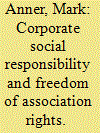|
|
|
Sort Order |
|
|
|
Items / Page
|
|
|
|
|
|
|
| Srl | Item |
| 1 |
ID:
115710


|
|
|
|
|
| Publication |
2012.
|
| Summary/Abstract |
Corporations have increasingly turned to voluntary, multi-stakeholder governance programs to monitor workers' rights and standards in global supply chains. This article argues that the emphasis of these programs varies significantly depending on stakeholder involvement and issue areas under examination. Corporate-influenced programs are more likely to emphasize detection of violations of minimal standards in the areas of wages, hours, and occupational safety and health because focusing on these issues provides corporations with legitimacy and reduces the risks of uncertainty created by activist campaigns. In contrast, these programs are less likely to emphasize workers' rights to form democratic and independent unions, bargain, and strike because these rights are perceived as lessening managerial control without providing firms with significant reputational value. This argument is explored by coding 805 factory audits of the Fair Labor Association between 2002 and 2010, followed by case studies of Russell Athletic in Honduras, Apple in China, and worker rights monitoring in Vietnam.
|
|
|
|
|
|
|
|
|
|
|
|
|
|
|
|
| 2 |
ID:
124319


|
|
|
|
|
| Publication |
2013.
|
| Summary/Abstract |
The withdrawal of GSP+ concessions granted by the European Union in August 2010 could bring about important implications for Sri Lanka's apparel industry, which is heavily dependent on the European market for its exports. A particular concern is the lack of an international level-playing field, with many of Sri Lanka's competitors having preferential access to European countries. In this context, the study analyzes the current impact of GSP+ withdrawal on the Sri Lankan apparel industry, possible future impacts and means of mitigating negative impacts and moving forward. An empirical analysis indicates that the GSP+ scheme has been central for apparel exports in penetrating the EU market, with the utilization rate averaging at 72 per cent over the 2005-2010 period and declining thereafter. While interviews carried out with stakeholders in the apparel industry reveal diverse viewpoints, the study concludes that the apparel industry remains highly vulnerable to the loss of GSP+ concessions and proposes several strategies in moving forward.
|
|
|
|
|
|
|
|
|
|
|
|
|
|
|
|
| 3 |
ID:
167247


|
|
|
|
|
| Summary/Abstract |
Sri Lankan apparel factories claim to be at the vanguard of ethical production on the global supply chain. Both to produce this image and to project their status as fair employers, industrialists offer health services at factory settings. This article focuses on two factory sites that have permanent qualified nurses to attend to illness and injuries, and medical doctors that visit twice a week. While on the face of it, these efforts are commendable, what my fieldwork signalled was that occupational health issues were inseparable from the creeping privatization of health care systems. Injuries or illnesses not treated within a ‘reasonable’ time frame were invariably referred to the private clinics of medical doctors. Ironically, this pattern is bolstered by the proliferation of what one worker described as ‘imaginary’ illnesses – that is, illnesses that workers concoct as a form of respite from the intense pressures of working in this sector. In this paper, I examine the ways in which workers get treated and how it is connected to an increasingly unregulated privatized landscape of healthcare. These shifts also show how the perspectives of citizenry change, despite the social welfare achievements around health and longevity of Sri Lankans.
|
|
|
|
|
|
|
|
|
|
|
|
|
|
|
|
| 4 |
ID:
172371


|
|
|
|
|
| Summary/Abstract |
This paper analyses labour migration and relocation of apparel production between Thailand and Myanmar during the first half of the 2010s. For a long time, unskilled migrant workers allowed labour-intensive industries such as the apparel sector to flourish in Thailand. However, higher costs have gradually decreased the competitiveness of the Thai garment industry, forcing implementation of industrial upgrading measures and relocation of some labour-intensive production to neighbouring countries. Conversely, Myanmar, a major source of migrant workers for Thailand, has increased its apparel exports since 2010. Using empirical evidence, this study reveals that, first, the Thai apparel industry has significantly upgraded while employing foreign workers and second, production networks between the two countries have solidified over the past decade.
|
|
|
|
|
|
|
|
|
|
|
|
|
|
|
|
|
|
|
|
|